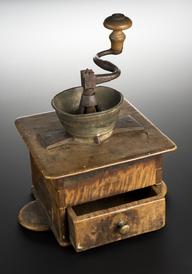
Cachet filling machine
- Made:
- 1850-1900 in unknown place
Cachet filling machine, used to fill rice paper cachets with medication, including tamper, mould, wooden accessories, metal rinks, silk sieve, gold leaf sheets and rice paper cachet, 1850-1900
This cachet filling apparatus speaks to the holistic medical practice of easing discomfort and pain during the administration of medicine. It comprises of several parts: rice paper cachets, mould, filling and sealing apparatus.
One half of the rice paper cachet would be placed on the metal mould, which is mounted on a wooden frame. The prescribed medicine powder would be inserted on to this half of the cachet, before the second half was placed on top, pressed and sealed using the tamper. The cachet capsule would be dipped in water to soften before swallowing. This process ensured bitter, foul-tasting medicines became easier to take.
First introduced in the 1870s, the use of cachets continued until the 1950s, demonstrating its use as both long term and common.
The object was originally collected by Sir Henry Wellcome and was part of his collection which captured ‘the individual, the provocative and the strange’. This cachet machine is particularly prevalent as an example of historical pharmacy-ware, as it linked to Wellcome’s business in pharmaceuticals. He was considered a pharmaceutical entrepreneur. The cachet filling apparatus was gifted to the Science Museum by the Wellcome Trust in 1980.
It is thought to be a Chapireau cachet set, owing to the design of the moulds, which is similar to another object we hold (object number: 1988-1001).
Details
- Category:
- Pharmacy-ware
- Object Number:
- 2023-76
- Materials:
- paper (fibre product), gold leaf, wood (unidentified), silk and metal (unknown)
- type:
- machines





